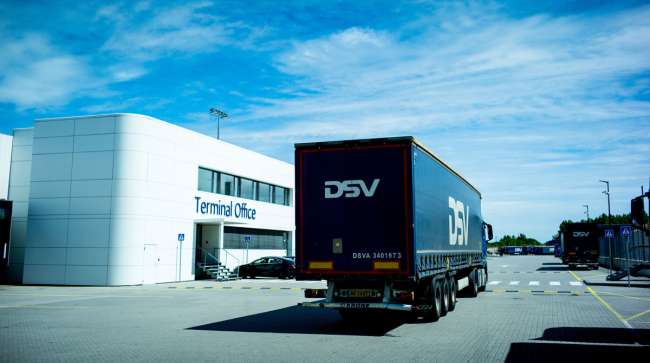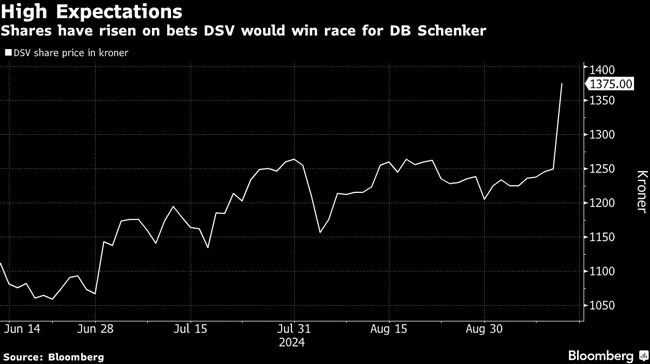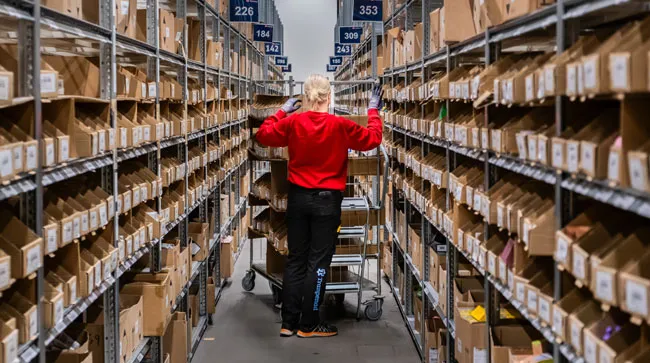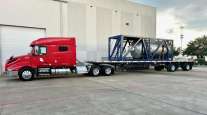DSV Buys DB Schenker for $15.9B, Creating Logistics Giant

[Stay on top of transportation news: Get TTNews in your inbox.]
Danish logistics company DSV A/S has agreed to purchase DB Schenker, a unit of Deutsche Bahn AG, in a $15.9 billion deal that will catapult DSV into one of the world’s largest freight forwarding and supply chain management firms. The all-cash transaction, announced Sept. 13, marks one of the biggest sales of a state-owned business in Germany in recent years.
The company said it will finance the purchase over the next 12 months through a share sale of as much as $5.5 billion and debt financing. The deal, which confirms an earlier Bloomberg News report, has an equity value of nearly $12 billion.
DSV, founded by 10 Danish truckers in the 1970s, grew through a string of acquisitions in the fragmented transport industry, including buying targets that were larger than itself. Taking over Schenker, which has about the same sized staff as DSV, will be the first big challenge for CEO Jens H. Lund. He took the top job this year from Jens Bjorn Andersen, under whom the share price jumped more than 10-fold over a 15-year tenure.
Based west of Copenhagen, DSV has built a reputation as a skilled integrator of its acquisitions, which include Panalpina Welttransport Holding AG in 2019 and UTi Worldwide Inc. three years earlier. In late 2022, DSV finished integrating its most recent large takeover, the $4.1 billion purchase of Kuwaiti logistics company GIL, and has since said it was ready to make a new acquisition.

Shares have risen on bets DSV would win race for DB Schenker. (Bloomberg)
Creating a Global Logistics Powerhouse
DB Schenker will represent a challenge for DSV’s team since the takeover target has about 73,000 employees — roughly the same number as the Danish buyer. Lund has often pointed out that DSV back in 2000 bought DFDS Dan Transport Group, which at the time was four times bigger than DSV.
The transaction will create the world’s biggest freight forwarder — a business that books space on trucks, ships and planes and helps manage the supply lines of consumer companies.
DSV A/S (North America) ranks No. 10 on the Transport Topics Top 100 list of the largest logistics companies in North America. It ranks No. 14 on the TT Top 50 list of the largest global freight carriers.
DB Schenker ranks No. 25 on the TT Top 100 list of the largest logistics companies in North America. Deutsche Bahn ranks No. 15 on the global freight carriers TT50.
The freight-forwarding industry benefited from the post-pandemic consumer boom, posting record profits, only to face a sharp drop in 2023 once supply lines and consumption normalized. Much of the industry has benefited again as the Red Sea conflict disrupted supply lines late last year, causing freight rates to jump again.
State-owned Deutsche Bahn, which is struggling with poor infrastructure in its rail network, said Sept. 13 that it will use the proceeds from the Schenker sale to cut its debt “significantly.”

A DB Schenker employee works at a logistics hub near Gothenburg, Sweden. (Nora Lorek/Bloomberg News)
Job Preservation and Regulatory Approvals
One of the key themes in the talks was the preservation of jobs in Germany. Verdi, the country’s most powerful labor union, last month made the unusual move of backing CVC’s bid, saying the private equity firm might fire fewer people after a takeover. DSV, in response, made additional job and investment pledges, according to Bloomberg News reports.
DSV said Sept. 13 it has “entered social undertakings” in relation to the German employees, which will apply for two years after closing. It pledged to invest about $1.1 billion over the next five years in Germany, “which will contribute to ensuring long-term growth and job creation.”
The transaction is subject to approval by Deutsche Bahn’s supervisory board and Germany’s transport ministry, as well as customary regulatory approvals.
Want more news? Listen to today's daily briefing below or go here for more info:




